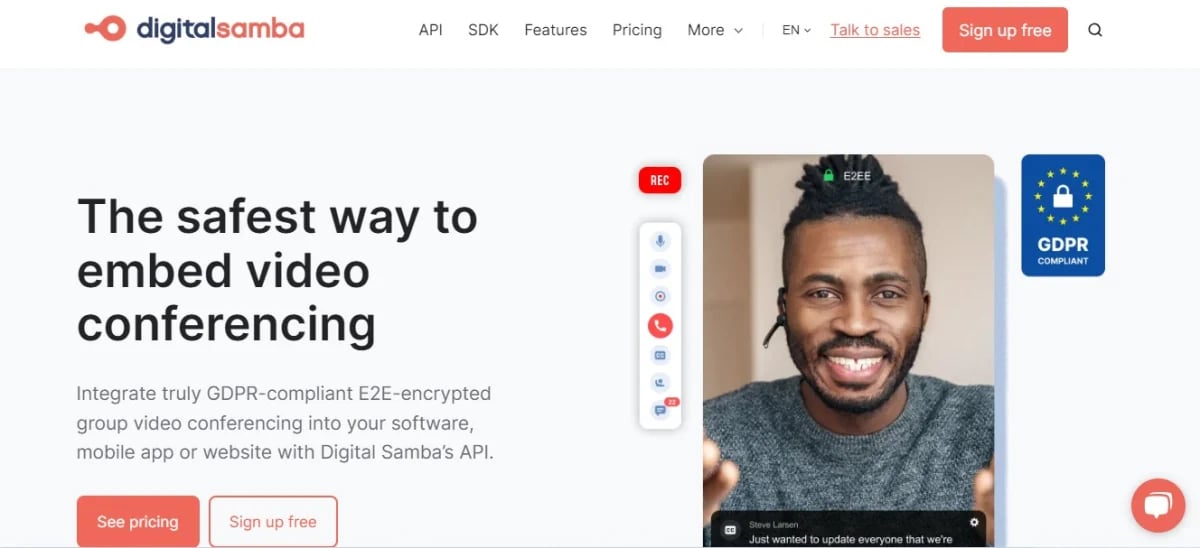Enhancing Legal Services with Secure Video Calls
Technology is changing the way lawyers work. Video calls offer a significant advantage for both solicitors and clients. They provide convenient meetings without travelling, saving time and money while making legal help more accessible. Video calls also improve communication, allowing lawyers and clients to share documents and pick up on critical nonverbal cues. This can speed up case progress and create a more client-focused approach to legal services. Naturally, security and privacy are crucial in the legal field.
In this article, we'll explore the benefits of video calls and discuss the key factors for ensuring safe video conferencing within the legal sector.
Table of contents
- Understanding video conferencing in legal services
- Benefits of video conferencing in legal services
- Challenges of legal service video conferencing
- Ensuring smooth, secure and private video calls in legal services
- Choosing the right video conferencing solution
- Digital Samba: Reliable, secure video calls for law firms and legal services
- Conclusion
Understanding video conferencing in legal services
Video conferencing is changing the world of legal services! It offers benefits that go beyond saving time and money. Lawyers can now meet clients, take depositions, and even appear in court—all without leaving their offices. This opens up legal help to more people, including those who find it hard to travel. Lawyers can also reach clients and expert witnesses all over the country, and assist with managing clients' wealth offshore.
Also, video conferencing makes teamwork easier. Lawyers can quickly connect with colleagues or specialists for advice, no matter where they are. This leads to better case planning and stronger legal arguments. Lawyers can also share documents and screens and even use virtual whiteboards to work together effectively.
Security is key for legal matters. The best video platforms for lawyers offer strong protection. They keep conversations private and make it easy to share sensitive files safely. Platforms that are compliant with data privacy regulations are vital for secure legal services.
For the best video conferencing experience, lawyers need a good internet connection, a decent-quality camera and microphone, and a solid understanding of the platform they use. By using video conferencing well, lawyers can work more efficiently, improve access to legal services, and offer clients an even better experience.
Benefits of video conferencing in legal services
Video conferencing is revolutionising the way lawyers work. Here's how it benefits both legal professionals and their clients:
Saves time and hassle
Connects people across distances
Cuts costs
Improves teamwork
Builds better client relationships
Seeing each other face-to-face, even on screen, helps lawyers build stronger connections with their clients. It allows for a better understanding of non-verbal cues, ensures clients feel heard and supported, and builds the trust that's essential in the attorney-client relationship.
Facilitates access to justice
Facilitates access to justice
Challenges of legal service video conferencing
Video conferencing offers lawyers and clients incredible convenience, but it also raises unique challenges. Some of these challenges include:
Security and privacy
Tech issues
Tech skills
Building trust
Data privacy laws
Sharing evidence
Ensuring smooth, secure and private video calls in legal services
In legal practice, video conferencing offers flexibility and efficiency, but the sensitive nature of legal matters demands the utmost security and privacy. Here's how to ensure your video calls uphold these standards:
- Choose a reliable platform: Don't just use any video call service! Invest in a platform specifically built with lawyers in mind. These platforms prioritise security features vital for legal work: end-to-end encryption (so only you and your clients can access the data), password-protected meetings, strict control over who joins a meeting, and options on where the video data is stored. Also, make sure the platform complies with regulations like GDPR, which protects personal data.
- Strong internet connection: Imagine trying to explain a complex contract clause while your video keeps freezing and your voice breaks up! Ensure both you and your client have high-speed internet connections for the smoothest video call experience. This minimises delays and helps you maintain a professional communication flow.
- Professional setting: Ditch the coffee shop! Choose a quiet, private room with good lighting and minimal distractions. A neutral background (think a blank wall or a simple bookshelf) helps maintain focus on the content of the discussion. Some platforms also support virtual backgrounds to enhance your background. This shows your client that you value confidentiality and demonstrates a high level of professionalism.
- Security protocols: Your firm should have a clear set of rules for video conferencing. This includes mandatory strong passwords, avoiding using video calls on public Wi-Fi (where hackers might lurk) and training your staff about the importance of keeping client discussions secret. Additionally, encourage the use of a password manager to store and manage all video conferencing passwords securely.
- Client consent: Never surprise a client with a video call! Clearly explain the technology, how it will be used, potential risks, and the steps you take to protect their privacy. Get their written consent before using video conferencing for legal matters.
Choosing the right video conferencing solution
With so many video conferencing tools available, how do lawyers choose the best one? The right solution depends on your specific needs as a legal professional. Here are some key factors to consider:
Security and privacy
Ease of use
Reliability
Integration
Cost-effectiveness
Scalability

How to Integrate Video Conferencing into Your Website
Read the blog
Digital Samba: Reliable, secure video calls for law firms and legal services

Video conferencing is transforming law firms. If you need a secure, reliable, and user-friendly solution, Digital Samba is the answer. Built with lawyers in mind, it keeps your client communications private with strong encryption and strict access controls.
Digital Samba complies with data regulations like GDPR for your peace of mind. It's easy to use, too! Share screens, files and even record meetings with just a few clicks. Say goodbye to frustrating technical issues; our 20+ years of experience guarantee clear video and sound.
Digital Samba works seamlessly with your existing calendar and office tools. Host everything from client meetings to large conferences, all while keeping sensitive information safe. Embed Digital Samba into your websites and apps for convenient communication.
Customise Digital Samba with your firm's branding for a professional touch. Our affordable pricing means powerful video conferencing is within reach for everyone. With top-notch security and helpful features, Digital Samba is the smart choice for your legal practice.
FAQs
Legal video conferencing refers to the use of secure video communication tools by law firms and legal professionals for remote meetings, consultations, and hearings. It enables lawyers to connect with clients and colleagues efficiently while ensuring confidentiality and compliance with legal standards.
Secure video calling is crucial for the legal industry because it protects sensitive client information and maintains confidentiality. Law firms must use encrypted video conferencing solutions to prevent data breaches and ensure compliance with legal privacy regulations.
Law firms can benefit from video conferencing by streamlining client consultations, reducing travel time, and facilitating remote collaboration among legal teams. Video conferencing for lawyers improves efficiency, enabling them to serve clients better while maintaining privacy.
Best practices for legal video privacy include using platforms with end-to-end encryption, enabling password-protected meetings, and ensuring that virtual meetings are conducted in secure environments. Lawyers should also choose secure video conferencing software specifically designed for the legal industry.
Legal videoconferencing enhances digital legal services by enabling law firms to offer remote consultations, conduct virtual hearings, and collaborate with clients and colleagues without compromising on security. It is a vital tool for modernising legal practices in the digital age.
Legal video services should include features like end-to-end encryption, secure authentication, and data protection to safeguard client communications. These tools help lawyers maintain confidentiality during legal calls and ensure compliance with privacy laws.
Private video calls allow lawyers to connect with clients securely, ensuring that sensitive discussions remain confidential. This improves client trust and allows legal professionals to offer more flexible, accessible services without compromising privacy.
Conclusion
Video calls are revolutionising the way law firms work. They offer clear benefits for both lawyers and their clients. With the right tools and practices, video conferencing can make legal services more accessible, efficient, and client-focused.
However, security and privacy must remain top priorities in the legal field. By carefully choosing technology, implementing strong security measures, and obtaining client consent, lawyers can harness the power of video conferencing to enhance their practice without compromising sensitive client information.
If you're looking for a video conferencing solution that puts security, ease of use, and reliability first, choose Digital Samba. It's designed with the unique needs of legal professionals in mind. Sign up today to start utilising our 10,000 free monthly credits.
Share this
You May Also Like
These Related Stories

Ensuring Video Conferencing Security: Risks, and Best Practices
.webp)
Enhance 1-on-1 Meetings with Essential Video Conferencing Features



